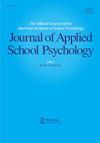评估心态在学校危机应对中的实施
IF 1.5
Q4 PSYCHOLOGY, EDUCATIONAL
引用次数: 0
摘要
尽管学校危机准备和应对的实践取得了进展,但评估数据非常有限。本文强调了对学校危机团队采用评估思维的重要性。评估可以是形成性的,在干预措施发生时进行分析,也可以是总结性的,以评估总体结果。华盛顿特区的一个大型郊区提供了一个说明性的例子,该地区自2007年以来一直在评估危机应对措施,过去五年的努力更具体地关注目标实现规模。从2015-2020年,该地区参与了70次记录在案的危机应对,31次针对人为或故意危机(如自杀、杀人、伤害),39次针对自然或意外死亡或伤害。最常见的危机干预措施是学生个体危机干预(n = 585)和学生心理教育小组(n = 359)。与自然或意外事件相比,个人危机干预、自杀风险评估、外部咨询转介和学生随访更常用于应对人为或故意的危机。提供了用于记录干预效果的工具和资源,包括目标实现规模,以及基于学校的危机小组如何在评估工作中使用这些信息的含义。本文章由计算机程序翻译,如有差异,请以英文原文为准。
Implementation of an Evaluation Mindset in School Crisis Response
Abstract Despite advances in the practice of school crisis preparedness and response, evaluation data are very limited. This article highlights the importance of adopting an evaluation mindset for school crisis teams. Evaluation can be formative, which analyzes interventions as they occur, and summative, to assess overall outcomes. An illustrative example is provided from a large suburban district in the Washington DC area that has been evaluating crisis response since 2007, with efforts in the past five years focusing more specifically on goal attainment scaling. From 2015–2020, the district engaged in 70 documented crisis responses, 31 for human-caused or intentional crises (e.g., suicide, homicide, injury) and 39 for natural or accidental deaths or injuries. The most common crisis interventions used were individual crisis intervention with students (n = 585) and student psychoeducational groups (n = 359). Individual crisis intervention, suicide risk assessment, referral for outside counseling, and student follow-up were more frequently used in response to human-caused or intentional crises compared to natural or accidental incidents. Tools and resources used to document the intervention effectiveness, including the goal attainment scaling, are provided along with implications for how school-based crisis teams can use this information in their evaluation efforts.
求助全文
通过发布文献求助,成功后即可免费获取论文全文。
去求助
来源期刊

Journal of Applied School Psychology
PSYCHOLOGY, EDUCATIONAL-
CiteScore
2.40
自引率
10.00%
发文量
7
期刊介绍:
With a new publisher (Taylor & Francis) and a new editor (David L. Wodrich), the Journal of Applied School Psychology will continue to publish articles and periodic thematic issues in 2009. Each submission should rest on either solid theoretical or empirical support and provide information that can be used in applied school settings, related educational systems, or community locations in which practitioners work. Manuscripts appropriate for publication in the journal will reflect psychological applications that pertain to individual students, groups of students, teachers, parents, and administrators. The journal also seeks, over time, novel and creative ways in which to disseminate information about practically sound and empirically supported school psychology practice.
 求助内容:
求助内容: 应助结果提醒方式:
应助结果提醒方式:


